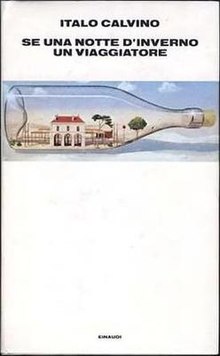Image from Wikipedia
And now for something completely different! Italo Calvino's If on a Winter's Night a Traveler, published 1979, is just that, a gloriously, breathlessly bonkers book that makes you smile. You might groan at the term "postmodernist novel"and grumble when you hear that part of the book is written in second person and the novel has an experimental structure, but don't let that put you off; this is a page-turner.
The novel starts in second person, telling you the Reader to put your feet up and start reading. Just when you get comfortable, the book changes on you. Turns out that there's been a mistake at the printer's, and after the opening chapter of Winter's Night, the novel continues as something completely different. And so it goes, over and over, the chapters of book openings alternating with the frame story of the Reader meeting Ludmilla (the Female Reader, I read this in Finnish so I'm not sure how the English translators handled this, Other Reader?). They try to get to the bottom of the mystery, and most importantly, keep reading.
This is the first 2nd person narrative that I've actually enjoyed, but I did get jolted out of the book a few times because the second person narrative assumes that the reader is male. The female Reader is addressed in second person in a short segment, but I didn't really relate to her, either. So there is bit of that indignant "no, I'm not" feel that you get in second person narratives, but it didn't keep me from enjoying the novel.
The opening chapters that make up half the book are fun in their own right: each one is written in a different style in a different genre, some done better than others. Many of them are so engaging that I actually felt the Reader's frustration. And I love the last Easter Egg revelation of what happens when you read all the chapter titles in one go.
This is very much a book about reading and writing, and I very much enjoyed reading Calvino's insight on the writer's mind and on why we read.
As a writer, I think it's important to experience different kinds of books, and this is inventive and unique without being only an intellectual exercise or impossible to read.
I highly recommend this book if you can handle a bit of surrealism and experimental narratives. If you can get through the first few chapters, you won't have any trouble. And as Calvino points out, it's a short book.
